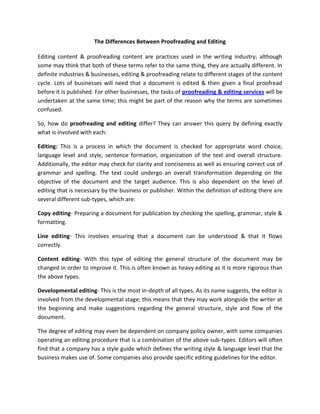The Differences Between Proofreading and Editing
- 1. The Differences Between Proofreading and Editing Editing content & proofreading content are practices used in the writing industry; although some may think that both of these terms refer to the same thing, they are actually different. In definite industries & businesses, editing & proofreading relate to different stages of the content cycle. Lots of businesses will need that a document is edited & then given a final proofread before it is published. For other businesses, the tasks of proofreading & editing services will be undertaken at the same time; this might be part of the reason why the terms are sometimes confused. So, how do proofreading and editing differ? They can answer this query by defining exactly what is involved with each: Editing: This is a process in which the document is checked for appropriate word choice, language level and style, sentence formation, organization of the text and overall structure. Additionally, the editor may check for clarity and conciseness as well as ensuring correct use of grammar and spelling. The text could undergo an overall transformation depending on the objective of the document and the target audience. This is also dependent on the level of editing that is necessary by the business or publisher. Within the definition of editing there are several different sub-types, which are: Copy editing- Preparing a document for publication by checking the spelling, grammar, style & formatting. Line editing- This involves ensuring that a document can be understood & that it flows correctly. Content editing- With this type of editing the general structure of the document may be changed in order to improve it. This is often known as heavy editing as it is more rigorous than the above types. Developmental editing- This is the most in-depth of all types. As its name suggests, the editor is involved from the developmental stage; this means that they may work alongside the writer at the beginning and make suggestions regarding the general structure, style and flow of the document. The degree of editing may even be dependent on company policy owner, with some companies operating an editing procedure that is a combination of the above sub-types. Editors will often find that a company has a style guide which defines the writing style & language level that the business makes use of. Some companies also provide specific editing guidelines for the editor.
- 2. Proofreading: This is usually the last stage before finalizing the text for publication. However, copy editing serves a similar purpose, but is more in-depth. Usually, at the proofreading stage, the text is checked for misspellings, grammar, punctuation and typo errors. This procedure involves reading the content and making positive alterations in order to remove any language, grammatical and typographical errors. The proofreader is not necessary to check whether the writing style and vocabulary used is appropriate as his task focuses chiefly on the accuracy of the text. If a company can afford to do so, it is beneficial to have documents edited as well as proofread those that are directed at an outside audience. Lots of businesses prefer to edit their own documents to start with since the workers may have a greater understanding of their target readership. Then, one time they have made any necessary changes, they will have the document proofread by a professional proofreader. It helps to employ a professional who is familiar with the particular business & the industry that it operates in, as this will make sure that the document is proofread and/or edited to a high standard by anyone who understands the company's aims & objectives. Most companies do not employ full-time, permanent staff in the role of proofreader since this tends to be an ad-hoc requirement unless the company constantly produces fresh documentation. For these reasons lots of businesses employ a freelancer whose services they can call on repeatedly whenever they have a requirement. There is no doubt that proofreading & editing both serve a purpose when preparing documents for publication. Usually editing is more in-depth & therefore more expensive. So, for clients that are on a budget, I would recommend having their documents professionally proofread as an absolute maximum after the document has been checked in-house to be definite that it fulfils all of the company's objectives & any style guides. Grammarholic provide proofreading, copywriting and thesis editing. To find out more about the full range of writing services offered by Grammarholic, Visit: http://www.grammarholic.com/ or E-mail: admin@grammarholic.com .

